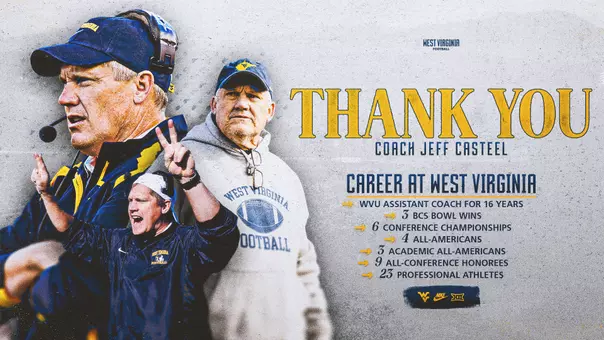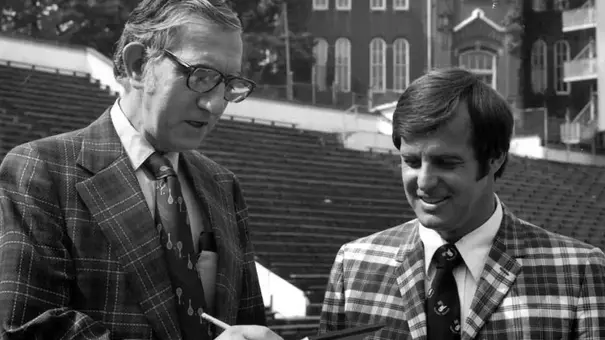
Hot Reads: Rocky Thoughts
August 30, 2018 05:00 PM | Football
Radio sideline reporter Jed Drenning provides periodic commentary on the Mountaineer football program for WVUsports.com. Be sure to follow him on Twitter @TheSignalCaller.
They were the most dominant team in the South.
They took on all comers, traveling the country by rail and dismantling opponents by scores like 105-0 and 100-3. They captured a dozen conference titles in a 21-year span and still claim a stake in two national championships during that run. This football factory of the early era wasn't from Alabama or Georgia. Instead, they hailed from Tennessee.
They were the Vanderbilt Commodores.
True story.
The college football balance of power in the Volunteer State nearly a hundred years ago tilted prominently toward the capital city where Vanderbilt owned an 18-2-2 advantage in its series against Tennessee. In 1926, when Vols president Nathan W. Dougherty promoted a young West Point graduate from assistant to head coach, the mandate he gave Robert Neyland left little to interpretation: "Even the score with Vanderbilt."
Neyland did that and more, helping Tennessee set the tone for an age of supremacy that endured into the next century. At one point, the Volunteers toppled the Commodores 71 times in 82 tries with a couple draws thrown in the mix. The championship hardware Tennessee amassed along the way continued to remind both programs of their place in the pecking order of the modern Southeastern Conference.
For Tennessee, all that success reached a crescendo in Tempe, Arizona on Jan. 4, 1999 in a showdown between two of the game's titans. Phillip Fulmer's unbeaten Volunteers squared off against Bobby Bowden's Florida State Seminoles in the inaugural BCS National Championship Game.
UT history is teeming with memorable plays, from "The Artful Dodger" Condredge Holloway's touchdown scramble against Georgia Tech in 1973 to Jeff Powell's 60-yard scoring jaunt against the star-studded Miami Hurricanes in the 1986 Sugar Bowl and Jeremy Lincoln's blocked field goal in South Bend in 1991. If ever, though, you could distill the championship pedigree of Tennessee football into a single play, it came that night in the desert with the Vols nursing a 14-9 lead over FSU in the fourth quarter.
It was third down and 9 and Tennessee was operating from deep inside its own territory. Quarterback Tee Martin took a five-step drop and nearly slipped in the pocket. With 'Noles defensive end Tony Bryant firing off the edge to lunge in behind Martin and swat for the football, the signal caller shuffled into a crow hop and heaved the ball into the night.
It feels strange to enter a college football season for the first time in my life without the melodic gridiron charm of Keith Jackson, but he was on the call that night for ABC.
"That ball goin' down the sidelines … It's caught! Peerless Price! It's a touchdown - there are no flags! The longest play of the year – 79 yards!"
The score, in effect, put the game on ice. As Price and his teammates rejoiced in the end zone, the Vols sideline erupted and The Pride of the Southland Band was right on cue. That one snapshot – that one indelible moment – elegantly personified a century of Tennessee excellence.
It was the sixth national championship in school history, but somehow this one seemed different. After all, it came on the heels of the departure of the greatest player ever clad in Big Orange. Tee Martin had attempted just 16 career passes entering the season, but less than eight months after the Indianapolis Colts made Peyton Manning (39-6 as a starter at Tennessee) the No. 1 pick in the NFL Draft, the Martin-led-Volunteers were hoisting the BCS trophy.
A Tennessee team that wasn't even supposed to win the SEC's Eastern Division had proven to the world that its program was much bigger than one man, even if that man is a legend of the highest order.
But all good things must come to an end, or at least take a sabbatical.
Since the win over Florida State that night in Tempe, the luster has gradually faded from The Power T. The Volunteers have stumbled through seven losing seasons in 19 years while posting an overall mark of 142-97 (.594). West Virginia, by comparison, has gone 152-88 (.633) over that same span.
Tennessee enters 2018 plagued by a losing streak against every single team in the SEC. That's even more remarkable when you consider that just a tick over 23 months ago, Butch Jones' Vols were 5-0 and ranked in the top 10. The wheels came off quickly.
It's true that winning cures all, but it's also true that losing contaminates everything it touches. That's how Rocky Top hit rock bottom under Jones.
In 2015, despite holding a lead of 13-plus points in each of its first five games, the Volunteers somehow slid to a 2-3 start. That's the kind of bleeding that, within a locker room, leads to an erosion of confidence in leadership.
Falling to Alabama at home as Tennessee did in 2016 is obviously a forgivable sin. Getting outgained 594-163 and suffering your school's worst loss to the Crimson Tide since 1906 is not – particularly when your team entered the game ranked No. 9 in the nation. At that point, your explanations start to sound like excuses.
Struggle to beat a winless UMass team, as Jones did last September, and you've probably jumped the shark. That was indeed the case, and when the dust finally settled on 2017, Tennessee had limped to its first-ever winless season in SEC play while getting tagged with a school-record eight losses.
What followed was perhaps the most disjointed coaching search college football has ever seen. From the tongue-in-cheek Jon Gruden watch and rejections by high-profile candidates to Greg Schiano signing a memorandum of understanding to accept the job before a swell of social media backlash forced the UT administration to call an audible, the process was a slipshod disaster.
After nearly a month of failed efforts and public humiliation, Tennessee was at DEFCON 1 (That's the bad one, right?). The jumbled nature of all this cost athletic director John Currie a job he only held for eight months.
UT Knoxville was in turmoil, and in times of crisis, you turn to the steady hand you trust most – even if it's a hand you once slapped away. On Dec. 1, the university announced Phillip Fulmer's appointment as its new athletic director. The architect of Tennessee's last national championship football team was immediately tasked with finding a suitable leader for the program and dousing the firestorm started by the tumultuous search.
Within six days, Fulmer did both.
With the hiring of Jeremy Pruitt, Tennessee got a no-nonsense leader with a track record of excellence as an assistant (five national titles). More importantly, it shifted the focus from the drama of 2017 toward the optimism of the future.
In his debut press conference, Pruitt stressed the importance of "creating the right culture." At SEC Media Days, he said "our No. 1 one goal is to build a championship program," and it's safe to assume he didn't mean that in a "champions of life" sort of way.
Like the two dozen men who preceded him as Tennessee's head coach, Pruitt was embracing the lofty expectations of the job.
One of those predecessors, of course, was Robert Neyland. But long before he was the coach that Bear Bryant couldn't beat, before he won four national titles, before a statue was erected in his honor and a stadium bore his name, Neyland wasn't "General." He was just a young guy trying get his team over the hump against Vanderbilt.
Kind of like Jeremy Pruitt.
Pruitt is the first Vols coach since Neyland in 1926 to inherit a team that's fresh off consecutive losses to the Commodores. In fact, since 2012, Tennessee has staggered to a 2-4 mark against Vanderbilt – and three of those losses have been by double-digits. Unlike the Roaring '20s, a losing record against Vanderbilt these days is probably symptomatic of larger problems.
Yes, like Neyland, Pruitt will be looking to "even the score with Vanderbilt." Unlike Neyland, however, there are bigger fish on his 'to fry' list. If Tennessee hopes to return to its proper place in the hierarchy of the SEC, beating the Commodores will necessarily become accustomed, not acclaimed.
First things first though. For Pruitt, the chore of getting Vol Nation to shake off the nightmares of 2017 begins Saturday in Charlotte against No. 17 West Virginia when he will become the first head coach in Tennessee history to open his career against a ranked opponent.
There's an old belief in football that every team out there is just a couple ifs away from being pretty good. Let's look at the "ifs" that could most directly impact the Vols' fortunes this fall.
TENNESSEE 'IF' #1)
If the Vols offensive line, anchored by 2017 Freshman All-American Trey Smith, can rebound from a season in which it succumbed to an uncanny rash of injuries, this offense has a chance. The numbers reflected those injuries as Tennessee managed an SEC-worst 3.4 yards per rush and yielded 35 sacks (tied for second-most in the league). The cupboard was so depleted last year against LSU that the Vols were reduced to four scholarship linemen (all freshmen) and a walk-on.
For the first time in more than 12 months, the Tennessee offensive line will be at full strength heading into the opener against WVU. Smith, a versatile player with a mean streak (55 knockdowns last season, including eight against Alabama) is a sturdy cornerstone for new OL coach Will Friend around whom to build. Friend will forge a unit from a room full of guys just a few years removed from being highly coveted recruits of the four- and five-star variety. Make no mistake, when playing at 100 percent the Vols have some bona fide body knockers at the point of attack who will provide a big test for Tony Gibson's defense.
The UT offense at large features a pair of serviceable signal callers (23 combined career TD passes, eight interceptions), formidable talent on the perimeter (four wide receiver options with a combined 121 catches and 13 TDs over the last two years), a nice blend of skills at the running back spot and one of the top junior college players in America last season (Dominick Wood-Anderson) as an option at tight end. If a healthy Vols o-line can gel under Friend, everything else might fall into place.
New Tennessee offensive coordinator Tyson Helton (who served on the UAB staff with Friend from 2007-10) spent the offseason extolling the benefits of a physical running game. That's not just coach-speak. Don't be surprised if the Volunteers go big early and often, incorporating tight ends or H-backs or both as they try to shorten the game and limit Will Grier's possessions. To do so means staying ahead of the chains and fostering manageable third downs by winning on early downs.
Expect the Vols offensive line to spearhead that effort. The segment coach they're playing for knows a thing or two about staying ahead of the sticks. Friend's offensive line at Colorado State last year paved the way for an attack that led the Mountain West Conference in third-down success (50.3 percent) and finished No. 2 nationally in that category.
TENNESSEE 'IF' #2)
If the Volunteers can pull off a seamless transition into a 3-4 defense, pivoting away (sort of) from the even-front base scheme Bob Shoop deployed under Butch Jones last season, the lift off of the Pruitt era will get some immediate thrust.
Mention such a transition to Tennessee fans and you might see panic in their eyes as they recall the hot mess they endured in 2012 when defensive coordinator Sal Sunseri tried to force a square peg (an odd-front scheme) into a round hole (a defense very specifically recruited to run a 4-3). The results? A Vols defense that couldn't play dead in a Western (last in the SEC at 36 points per game allowed), a 5-7 finish and a pink slip for coach Derek Dooley.
Rest assured, this ain't that.
Jeremy Pruitt doesn't deal in schematic absolutes. Yes, he intends to deploy a 3-4 defense, but you might just as often see the Vols line up in a four-man front. Watch Pruitt's defenses at Florida State, Georgia and Alabama. Their greatest strength was their versatility. Beyond substantial talent, what set them apart was their ability to morph into multiple looks and harass opposing offenses from each of those looks.
Pruitt downplays the change, saying football is football.
"Really when you talk about 3-4 and 4-3, to me there's not much difference. If you watched us play (at Alabama last season), if you watch us play this year, we'll probably be half and half. There will be some games where we're all 3-4. There will be some games that'll be mostly four-down fronts."
That philosophy was reflected in Pruitt's first spring game as the Vols defense showed even and odd fronts.
"You've got to be able to do both, to me, if you're going to be dominant on defense. You've got to be able to give the other team various looks that make them have to prepare for both."
The linchpins in this transition will be the hybrid players on the edge who last year had their hand in the dirt as defensive ends. In the odd front rolled out by Pruitt and new defensive coordinator Kevin Sherer, they'll be asked to stand up and play on the outside. This results in linebackers with the size and wingspan needed to spar with offensive tackles but also the burst to press the edge as pass rushers. That appears to be the case with Tennessee's personnel, as guys like sophomore Darrell Taylor (6-4, 247) and senior Jonathan Kongbo (6-5, 254) figure to hold down these posts. They'll occupy the outside backer spots when the Vols line up in odd, and you'll likely see one or both of them slide back down into an end position when the UT defense goes even.
If Tennessee can navigate this transition without a hiccup and dial up effective looks out of even and odd fronts right out of the chutes against the Mountaineers, the burden will be eased on the instability and youth Pruitt and Sherer are contending with on the backend of their defense, particularly at cornerback.
And so here we go -- two storied programs on a collision course for the first time ever despite being separated by just 420 miles and combining for nearly 1,600 all-time wins. The site might be neutral on Saturday, but the 75,000 mountain folks who slip out of the Appalachians and Smokies for some light entertainment at Bank of America Stadium sure won't be. It's Rocky Top versus Country Roads; "Wild as a mink, but sweet as soda pop" against"Misty taste of moonshine, teardrop in my eye."
There are certain teams, certain brands, that always represent a worthy target, those programs whose name is synonymous with excellence and whose history is woven into the fabric of the game. Whether you catch them at their best, at their worst, or in transition, a win over such teams is always a pelt to hang with pride. By any reasonable measure, this short list of blue bloods almost certainly includes the Tennessee Volunteers.
A tremendous opportunity awaits the West Virginia Mountaineers on Saturday.
They might not be Vanderbilt, but for now they'll have to do.
I'll see you at the 50.
They were the most dominant team in the South.
They took on all comers, traveling the country by rail and dismantling opponents by scores like 105-0 and 100-3. They captured a dozen conference titles in a 21-year span and still claim a stake in two national championships during that run. This football factory of the early era wasn't from Alabama or Georgia. Instead, they hailed from Tennessee.
They were the Vanderbilt Commodores.
True story.
The college football balance of power in the Volunteer State nearly a hundred years ago tilted prominently toward the capital city where Vanderbilt owned an 18-2-2 advantage in its series against Tennessee. In 1926, when Vols president Nathan W. Dougherty promoted a young West Point graduate from assistant to head coach, the mandate he gave Robert Neyland left little to interpretation: "Even the score with Vanderbilt."
Neyland did that and more, helping Tennessee set the tone for an age of supremacy that endured into the next century. At one point, the Volunteers toppled the Commodores 71 times in 82 tries with a couple draws thrown in the mix. The championship hardware Tennessee amassed along the way continued to remind both programs of their place in the pecking order of the modern Southeastern Conference.
For Tennessee, all that success reached a crescendo in Tempe, Arizona on Jan. 4, 1999 in a showdown between two of the game's titans. Phillip Fulmer's unbeaten Volunteers squared off against Bobby Bowden's Florida State Seminoles in the inaugural BCS National Championship Game.
UT history is teeming with memorable plays, from "The Artful Dodger" Condredge Holloway's touchdown scramble against Georgia Tech in 1973 to Jeff Powell's 60-yard scoring jaunt against the star-studded Miami Hurricanes in the 1986 Sugar Bowl and Jeremy Lincoln's blocked field goal in South Bend in 1991. If ever, though, you could distill the championship pedigree of Tennessee football into a single play, it came that night in the desert with the Vols nursing a 14-9 lead over FSU in the fourth quarter.
It was third down and 9 and Tennessee was operating from deep inside its own territory. Quarterback Tee Martin took a five-step drop and nearly slipped in the pocket. With 'Noles defensive end Tony Bryant firing off the edge to lunge in behind Martin and swat for the football, the signal caller shuffled into a crow hop and heaved the ball into the night.
It feels strange to enter a college football season for the first time in my life without the melodic gridiron charm of Keith Jackson, but he was on the call that night for ABC.
"That ball goin' down the sidelines … It's caught! Peerless Price! It's a touchdown - there are no flags! The longest play of the year – 79 yards!"
The score, in effect, put the game on ice. As Price and his teammates rejoiced in the end zone, the Vols sideline erupted and The Pride of the Southland Band was right on cue. That one snapshot – that one indelible moment – elegantly personified a century of Tennessee excellence.
It was the sixth national championship in school history, but somehow this one seemed different. After all, it came on the heels of the departure of the greatest player ever clad in Big Orange. Tee Martin had attempted just 16 career passes entering the season, but less than eight months after the Indianapolis Colts made Peyton Manning (39-6 as a starter at Tennessee) the No. 1 pick in the NFL Draft, the Martin-led-Volunteers were hoisting the BCS trophy.
A Tennessee team that wasn't even supposed to win the SEC's Eastern Division had proven to the world that its program was much bigger than one man, even if that man is a legend of the highest order.
But all good things must come to an end, or at least take a sabbatical.
Since the win over Florida State that night in Tempe, the luster has gradually faded from The Power T. The Volunteers have stumbled through seven losing seasons in 19 years while posting an overall mark of 142-97 (.594). West Virginia, by comparison, has gone 152-88 (.633) over that same span.
Tennessee enters 2018 plagued by a losing streak against every single team in the SEC. That's even more remarkable when you consider that just a tick over 23 months ago, Butch Jones' Vols were 5-0 and ranked in the top 10. The wheels came off quickly.
It's true that winning cures all, but it's also true that losing contaminates everything it touches. That's how Rocky Top hit rock bottom under Jones.
In 2015, despite holding a lead of 13-plus points in each of its first five games, the Volunteers somehow slid to a 2-3 start. That's the kind of bleeding that, within a locker room, leads to an erosion of confidence in leadership.
Falling to Alabama at home as Tennessee did in 2016 is obviously a forgivable sin. Getting outgained 594-163 and suffering your school's worst loss to the Crimson Tide since 1906 is not – particularly when your team entered the game ranked No. 9 in the nation. At that point, your explanations start to sound like excuses.
Struggle to beat a winless UMass team, as Jones did last September, and you've probably jumped the shark. That was indeed the case, and when the dust finally settled on 2017, Tennessee had limped to its first-ever winless season in SEC play while getting tagged with a school-record eight losses.
What followed was perhaps the most disjointed coaching search college football has ever seen. From the tongue-in-cheek Jon Gruden watch and rejections by high-profile candidates to Greg Schiano signing a memorandum of understanding to accept the job before a swell of social media backlash forced the UT administration to call an audible, the process was a slipshod disaster.
After nearly a month of failed efforts and public humiliation, Tennessee was at DEFCON 1 (That's the bad one, right?). The jumbled nature of all this cost athletic director John Currie a job he only held for eight months.
UT Knoxville was in turmoil, and in times of crisis, you turn to the steady hand you trust most – even if it's a hand you once slapped away. On Dec. 1, the university announced Phillip Fulmer's appointment as its new athletic director. The architect of Tennessee's last national championship football team was immediately tasked with finding a suitable leader for the program and dousing the firestorm started by the tumultuous search.
Within six days, Fulmer did both.
With the hiring of Jeremy Pruitt, Tennessee got a no-nonsense leader with a track record of excellence as an assistant (five national titles). More importantly, it shifted the focus from the drama of 2017 toward the optimism of the future.
In his debut press conference, Pruitt stressed the importance of "creating the right culture." At SEC Media Days, he said "our No. 1 one goal is to build a championship program," and it's safe to assume he didn't mean that in a "champions of life" sort of way.
Like the two dozen men who preceded him as Tennessee's head coach, Pruitt was embracing the lofty expectations of the job.
One of those predecessors, of course, was Robert Neyland. But long before he was the coach that Bear Bryant couldn't beat, before he won four national titles, before a statue was erected in his honor and a stadium bore his name, Neyland wasn't "General." He was just a young guy trying get his team over the hump against Vanderbilt.
Kind of like Jeremy Pruitt.
Pruitt is the first Vols coach since Neyland in 1926 to inherit a team that's fresh off consecutive losses to the Commodores. In fact, since 2012, Tennessee has staggered to a 2-4 mark against Vanderbilt – and three of those losses have been by double-digits. Unlike the Roaring '20s, a losing record against Vanderbilt these days is probably symptomatic of larger problems.
Yes, like Neyland, Pruitt will be looking to "even the score with Vanderbilt." Unlike Neyland, however, there are bigger fish on his 'to fry' list. If Tennessee hopes to return to its proper place in the hierarchy of the SEC, beating the Commodores will necessarily become accustomed, not acclaimed.
First things first though. For Pruitt, the chore of getting Vol Nation to shake off the nightmares of 2017 begins Saturday in Charlotte against No. 17 West Virginia when he will become the first head coach in Tennessee history to open his career against a ranked opponent.
There's an old belief in football that every team out there is just a couple ifs away from being pretty good. Let's look at the "ifs" that could most directly impact the Vols' fortunes this fall.
TENNESSEE 'IF' #1)
If the Vols offensive line, anchored by 2017 Freshman All-American Trey Smith, can rebound from a season in which it succumbed to an uncanny rash of injuries, this offense has a chance. The numbers reflected those injuries as Tennessee managed an SEC-worst 3.4 yards per rush and yielded 35 sacks (tied for second-most in the league). The cupboard was so depleted last year against LSU that the Vols were reduced to four scholarship linemen (all freshmen) and a walk-on.
For the first time in more than 12 months, the Tennessee offensive line will be at full strength heading into the opener against WVU. Smith, a versatile player with a mean streak (55 knockdowns last season, including eight against Alabama) is a sturdy cornerstone for new OL coach Will Friend around whom to build. Friend will forge a unit from a room full of guys just a few years removed from being highly coveted recruits of the four- and five-star variety. Make no mistake, when playing at 100 percent the Vols have some bona fide body knockers at the point of attack who will provide a big test for Tony Gibson's defense.
The UT offense at large features a pair of serviceable signal callers (23 combined career TD passes, eight interceptions), formidable talent on the perimeter (four wide receiver options with a combined 121 catches and 13 TDs over the last two years), a nice blend of skills at the running back spot and one of the top junior college players in America last season (Dominick Wood-Anderson) as an option at tight end. If a healthy Vols o-line can gel under Friend, everything else might fall into place.
New Tennessee offensive coordinator Tyson Helton (who served on the UAB staff with Friend from 2007-10) spent the offseason extolling the benefits of a physical running game. That's not just coach-speak. Don't be surprised if the Volunteers go big early and often, incorporating tight ends or H-backs or both as they try to shorten the game and limit Will Grier's possessions. To do so means staying ahead of the chains and fostering manageable third downs by winning on early downs.
Expect the Vols offensive line to spearhead that effort. The segment coach they're playing for knows a thing or two about staying ahead of the sticks. Friend's offensive line at Colorado State last year paved the way for an attack that led the Mountain West Conference in third-down success (50.3 percent) and finished No. 2 nationally in that category.
TENNESSEE 'IF' #2)
If the Volunteers can pull off a seamless transition into a 3-4 defense, pivoting away (sort of) from the even-front base scheme Bob Shoop deployed under Butch Jones last season, the lift off of the Pruitt era will get some immediate thrust.
Mention such a transition to Tennessee fans and you might see panic in their eyes as they recall the hot mess they endured in 2012 when defensive coordinator Sal Sunseri tried to force a square peg (an odd-front scheme) into a round hole (a defense very specifically recruited to run a 4-3). The results? A Vols defense that couldn't play dead in a Western (last in the SEC at 36 points per game allowed), a 5-7 finish and a pink slip for coach Derek Dooley.
Rest assured, this ain't that.
Jeremy Pruitt doesn't deal in schematic absolutes. Yes, he intends to deploy a 3-4 defense, but you might just as often see the Vols line up in a four-man front. Watch Pruitt's defenses at Florida State, Georgia and Alabama. Their greatest strength was their versatility. Beyond substantial talent, what set them apart was their ability to morph into multiple looks and harass opposing offenses from each of those looks.
Pruitt downplays the change, saying football is football.
"Really when you talk about 3-4 and 4-3, to me there's not much difference. If you watched us play (at Alabama last season), if you watch us play this year, we'll probably be half and half. There will be some games where we're all 3-4. There will be some games that'll be mostly four-down fronts."
That philosophy was reflected in Pruitt's first spring game as the Vols defense showed even and odd fronts.
"You've got to be able to do both, to me, if you're going to be dominant on defense. You've got to be able to give the other team various looks that make them have to prepare for both."
The linchpins in this transition will be the hybrid players on the edge who last year had their hand in the dirt as defensive ends. In the odd front rolled out by Pruitt and new defensive coordinator Kevin Sherer, they'll be asked to stand up and play on the outside. This results in linebackers with the size and wingspan needed to spar with offensive tackles but also the burst to press the edge as pass rushers. That appears to be the case with Tennessee's personnel, as guys like sophomore Darrell Taylor (6-4, 247) and senior Jonathan Kongbo (6-5, 254) figure to hold down these posts. They'll occupy the outside backer spots when the Vols line up in odd, and you'll likely see one or both of them slide back down into an end position when the UT defense goes even.
If Tennessee can navigate this transition without a hiccup and dial up effective looks out of even and odd fronts right out of the chutes against the Mountaineers, the burden will be eased on the instability and youth Pruitt and Sherer are contending with on the backend of their defense, particularly at cornerback.
And so here we go -- two storied programs on a collision course for the first time ever despite being separated by just 420 miles and combining for nearly 1,600 all-time wins. The site might be neutral on Saturday, but the 75,000 mountain folks who slip out of the Appalachians and Smokies for some light entertainment at Bank of America Stadium sure won't be. It's Rocky Top versus Country Roads; "Wild as a mink, but sweet as soda pop" against"Misty taste of moonshine, teardrop in my eye."
There are certain teams, certain brands, that always represent a worthy target, those programs whose name is synonymous with excellence and whose history is woven into the fabric of the game. Whether you catch them at their best, at their worst, or in transition, a win over such teams is always a pelt to hang with pride. By any reasonable measure, this short list of blue bloods almost certainly includes the Tennessee Volunteers.
A tremendous opportunity awaits the West Virginia Mountaineers on Saturday.
They might not be Vanderbilt, but for now they'll have to do.
I'll see you at the 50.
Players Mentioned
Rich Rodriguez | Dec. 3
Wednesday, December 03
Reid Carrico | Nov. 29
Saturday, November 29
Jeff Weimer | Nov. 29
Saturday, November 29
Rich Rodriguez | Nov. 29
Saturday, November 29
















